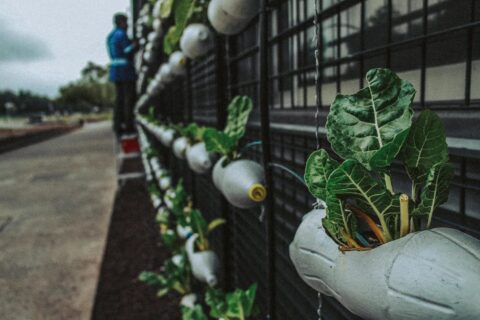Explainer
The Deep History of Racism and Speciesism Behind ‘They’re Eating the Dogs’
Election 2024•7 min read
Perspective
Lauren Ornelas is the founder of the Food Empowerment Project, a vegan food justice organization that shows people how various issues of oppression are connected to the food system.


Words by Rachel Krantz
In a time when so many are talking about the impact of eating animals on public health as well as food insecurity, we thought it would be the perfect time to reach out to someone working on both issues to learn more. Lauren Ornelas is the founder of The Food Empowerment Project (FEP), a vegan food justice organization that shows people how various issues of oppression are connected, with a focus on food.
FEP has long had my utmost respect for advocating not just for veganism — but also for the rights of the farm workers who pick our foods, and for access to healthy foods in Black and Brown communities. The organization also encourages people not to buy chocolate and other products sourced from areas where the worst forms of child labor and slavery exist and keep a running list of more ethical chocolate brands that I personally consult regularly.
Freelance writer and Sentient Media advisor Rachel Krantz asked Ornelas for her thoughts on how this current pandemic is connected to both veganism and food justice for humans — and what we can practically do about it, especially when it comes to our personal shopping habits.
How does the coronavirus bring attention to inequalities in our food system you’ve already been working on?
I think it really magnifies them and exacerbates them. Farmworkers in this country are already not afforded basic protections, rights, benefits, and living wages, and only now are they deemed “essential workers,” but not given the benefits that other essential workers receive as part of the federal package. Also, the concept of not having food available to you that you would like to buy is how many people in Black, Indigenous, and Brown communities live.
Are there any ways you suggest people can help now, especially, when people are struggling to have enough money for food during coronavirus?
We really encourage people to use this as an opportunity to not support only band-aid approaches to help others right now but to also really make sure they are supporting ways in which we can change the racist, unequal, and unjust systems that take place by advocating for things such as paid sick leave for all, free medical care, and abolishing ICE.
What are some vegan-friendly ways to contribute to food banks/food services? Like, what if I want to donate but am worried about indirectly supporting animal products?
Again, we really want people to look at the ways in which they can use their voice for these structural changes, but in terms of donating food, we are waiting to hear back from the farm worker organizations we work with to determine how we can assist. We also created this resource on donating food several years ago to help people who truly want to make a difference.
How do food deserts impact how “easy it is” for people to go vegan?
Areas where people lack access to healthy foods (food apartheid areas) means that communities (primarily Black, Indigenous, and Brown) do not have access to healthy foods, which includes not just “meat” and dairy alternatives to animal products but also fresh fruits and vegetables. Many people living in these communities, where there are not a lot of places to grow food and there are few if any grocery stores, are forced to shop at liquor stores and convenience stores for food.
How do you explain most succinctly why you believe veganism is also a human rights issue?
I think I try to focus more on explaining that these issues are connected. To think a world without exploitation of non-human animals can exist where racism, sexism, ableism, and LBGTQ discrimination still exist is ignoring the roots of why animals are exploited.
What are some foods vegans are buying that aren’t necessarily ethical, besides chocolate/coffee/palm oil?
In addition to those listed, I would include bananas, wine, and also areas that we are still needing to look into, such as cashews and avocados. However, there are a lot of companies that engage in unethical practices that vegans seem to be supporting, which includes testing on animals such as Ben & Jerry’s (owned by Unilever – which tests on animals) and other companies like Nestle and Coca Cola that engage in egregious human rights abuses.
What do you say to people who say veganism is a “white” thing?
That I completely understand why they feel that way as it certainly has been represented as such but that it is mostly because it is a white-dominated movement that has not been great about promoting the work of Black- and Brown-run organizations that promote veganism. And I ask them not to judge vegans or vegan organizations based on that as many of us have organizations with a more holistic view.
What are the top 3 steps I could take now as a vegan (who already buys Fair Trade where possible) to start shopping more ethically?
We encourage people not to rely on certifications such as “Fair Trade” for their shopping as there have been issues found with all of them. I want to be clear that I acknowledge that being able to “eat your ethics” can be a privilege as many people just struggle to be able to eat. But for those of us who have the ability to go vegan and take time to think about our food choices more critically, I think it is important for us to learn who produces the food they are eating. Is it Nestle? Is there a boycott called by farm workers on specific products? We encourage people to buy chocolate from our recommended list. I feel weird saying that, as my intention is not self-promotion, but instead it really is a list that I trust as the certifications aren’t reliable at this time.
Honestly, more than that, it is difficult at this time to talk about food issues when so many people are struggling to eat. It is important that people remember it is not just about their food choices but also to support efforts to create equity in the food system and support the boycotts called by farm workers.